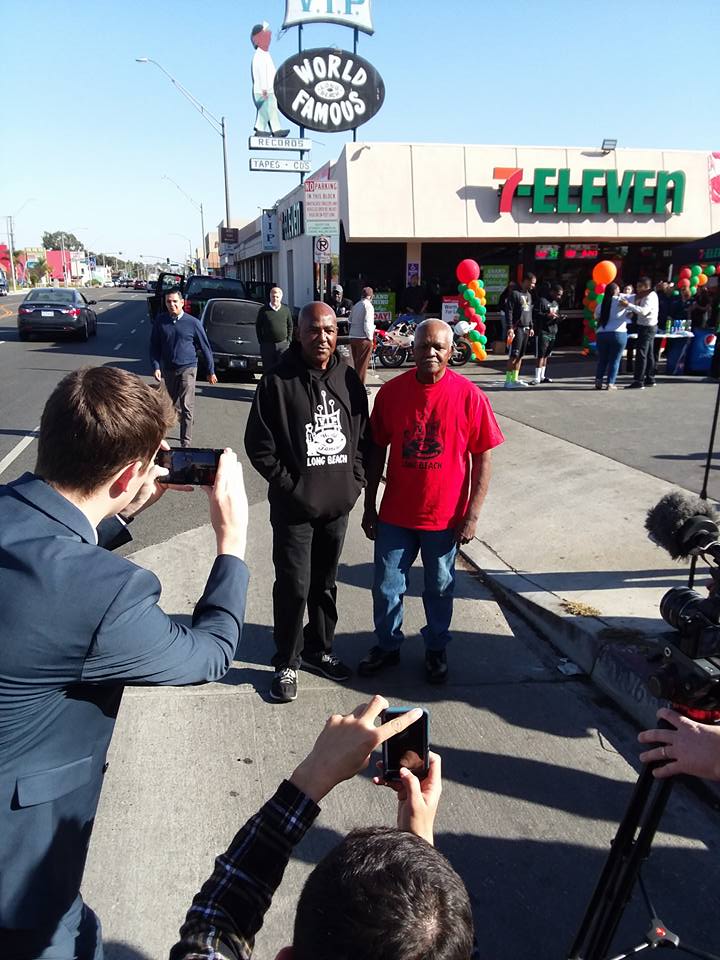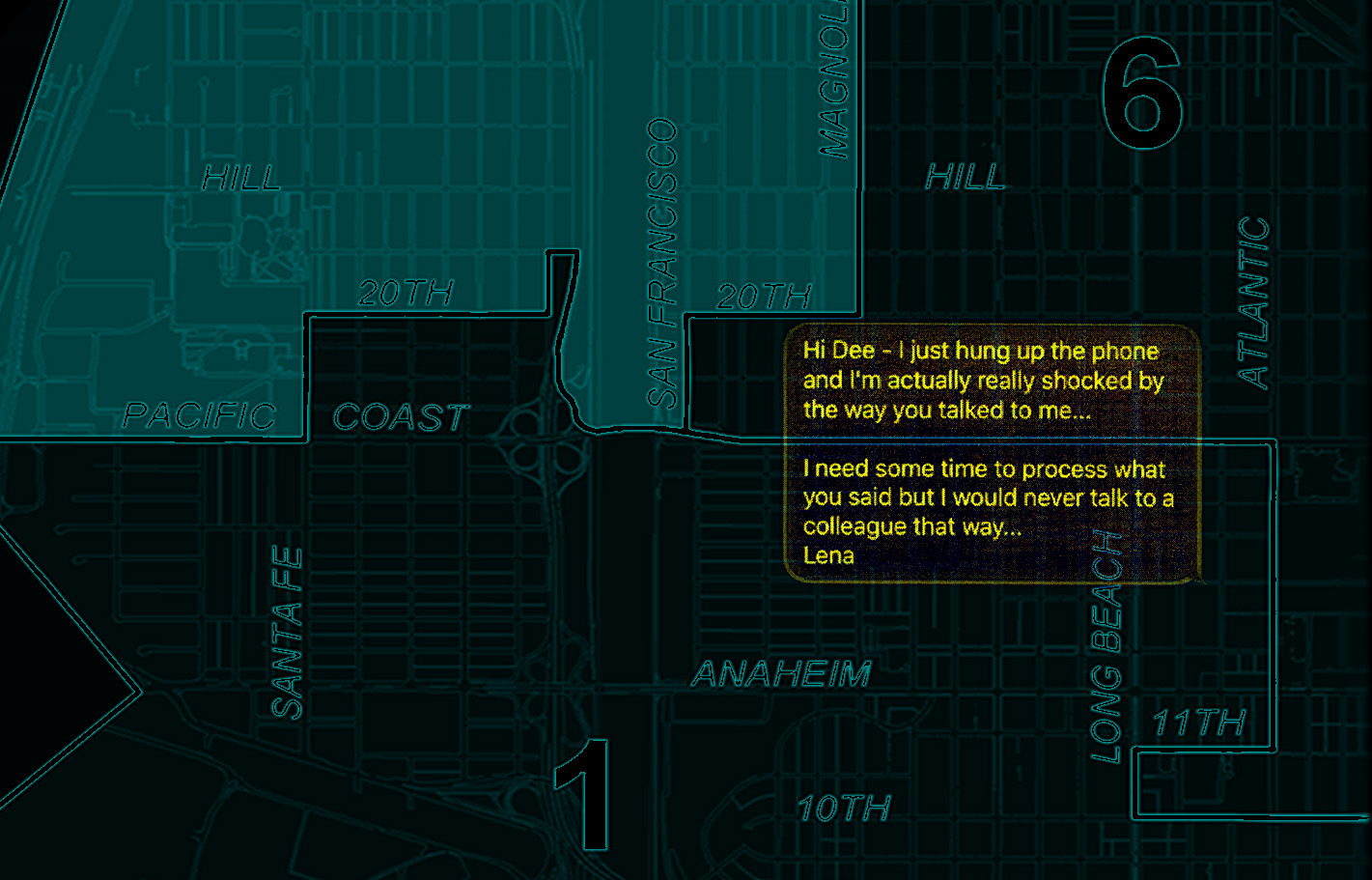Complaint Buried After Councilman Allegedly Threatens Councilwoman
16 minute readA hostile workplace complaint lodged by Councilmember Lena Gonzalez (CD-1) with the City Attorney’s Office in May alleged that Vice Mayor Dee Andrews (CD-6) made threatening remarks to her during a phone call, according to multiple sources familiar with the incident and records obtained by FORTHE Media.
In the ensuing four months—during which Andrews was promoted to vice mayor via a split council vote—Gonzalez said she received radio silence from the City Attorney’s Office regarding her complaint. After being interviewed by one of their investigators, she did not receive any type of follow-up or a debriefing—a level of disregard that Dana Sumpter, an associate professor of Human Resource Management at Cal State Long Beach, said is “almost a textbook definition of ignoring a harassment claim.”
The experience left Gonzalez second-guessing the system in place for the city’s legislative workforce to file workplace complaints, which is routed through the City Attorney’s Office instead of the Human Resources Department. She said the process is unclear and leaves victims to fend for themselves, uncertain that the perpetrator will be held accountable.
“Something needs to be done. There needs to be a more formal process with these types of complaints. A threat is a threat,” she said.
A statement from Andrews’ office instead characterized the incident as a “disagreement on policy.” The City Attorney’s Office declined to shed light on the findings of an internal investigation they conducted, but said no criminal activity was uncovered.
The Call
On May 8, at around 12:30 p.m., hours before a city council meeting, Andrews called Gonzalez on her cell phone—which she says isn’t a typical occurrence.
She recalls Andrews’ remarks were rambling throughout the call—“it was very fast … a lot of mish-mashed words”—and jumped from subject to subject. She said the conversation turned tense when Andrews alluded to a fundraiser she had attended, along with Councilmembers Jeannine Pearce (CD-2) and Rex Richardson (CD-9), on April 27 at the newly opened VIP Create Space—a business incubator offshoot of World Famous VIP Records. Photos of her at the event had made it onto social media, and her attendance had rankled Andrews, according to multiple sources we spoke to.
At that point, Gonzalez says Andrews told her not to get involved with matters involving VIP Records and followed that with “watch your back or you’re going to get hit and killed by a bus.”
She asked him to repeat the comment, and he did, and when she asked him if he was threatening her, he said “I didn’t mean anything by it,” though continued to make intimidating comments, she said.
“It was such a weird conversation. He started to say he was sorry,” Gonzalez said. “But then he would revert to calling me names, basically telling me ‘I didn’t know what I was talking about.’”
Andrews also insinuated that Gonzalez’s political career was at risk if she continued to support VIP Records and then mentioned he was gunning for the vice mayor position before the call ended, she said.
“I hung up the phone and I needed a moment to process it … I was super shocked. He had clearly threatened me,” Gonzalez said. “Granted it was a phone call, but I don’t think I’ve ever been talked to like that in my life.”
In a text message—which we obtained through a public records request—sent at 12:49 p.m., shortly after the call, Gonzalez wrote to Andrews: “Hi Dee – I just hung up the phone and I’m actually really shocked by the way you talked to me… I need some time to process what you said but I would never talk to a colleague that way…”
In another text message, reviewed by FORTHE Media, that Gonzalez sent to a friend an hour later, she wrote: “He threatened me,” referring to Andrews’ comments.
“She called me in tears. She was affected. She was freaked out,” said Pearce, who Gonzalez also contacted soon after the alleged threat took place.
Andrews’ office replied to an interview request on the matter with a statement downplaying the phone conversation between the two councilmembers, whose districts share parts of Central Long Beach.
“Vice Mayor Andrews and a Council colleague had a disagreement on policy that would affect the Sixth District. There is no further comment on this inquiry,” the statement said.
In a voicemail that Andrews left on Gonzalez’s phone soon after the call, which we also obtained through a public records request, he said, “Lena, I don’t think you would understand what I was trying to say. There’s no disrespecting you, or anybody else on that dais. I was just trying to give you some heads up.”
Voicemail left by Councilmember Andrews on Councilmember Gonzalez’s phone on May 8.
That same day, Gonzalez called City Attorney Charles Parkin and lodged a verbal complaint. The City Attorney’s Office says that a hostile workplace investigation was launched and closed sometime in May, though the exact date it concluded could not be determined by the City Attorney’s Office despite several inquiries. [Editors note: The City Attorney’s Office clarified that the investigation “closed in May in terms of the last communication” with the councilmembers involved. “However there was still internal research and discussion regarding the issue within the City Attorney’s Office,” they said. The case was fully closed on July 12.]
The Tuesday of the alleged threat, Gonzalez did not attend the scheduled city council meeting.
“I did not want to see him,” she said.

Councilmember Lena Gonzalez,left, with Tromaine Asar Ellis at the VIP Create Space during a fundraiser on April 27 | Photo courtesy of Shirin Senegal
No Follow-Up
Months went by and Gonzalez says she was not made aware of a probe and did not receive a follow-up. She says she only learned two weeks ago that an investigation had been undertaken and concluded, after inquiries from the press.
“I think, you know, when you’re so busy doing things and working and you have a family—I’ve sort of suppressed it and put it away,” Gonzalez said.
Principal Deputy City Attorney Gary Anderson, who handles workplace investigations for the office, confirmed that he “did not have a conversation to close [the investigation] out” with Gonzalez or Andrews.
“In my experience, the most troubling aspects of complaints is the lack of closure for the victims of harassment,” said Councilmember Roberto Uranga (CD-7), who before being voted onto the council accrued a breadth of experience handling employee matters in his 28 years working for the city in various capacities. “They need and deserve closure, something the City needs to address and improve upon.”
Gonzalez said watching her accused harasser become vice mayor felt “awful.”
“It’s a big slap to our face that [Andrews] can continue to get praise, and continue to do things, and continue to excel,” Gonzalez said.
Andrews, an 11-year councilmember, won a third term as a write-in candidate in 2016, and was elected by the city council to the vice mayor post with a 6-3 vote on July 17. Gonzalez, Pearce, and Uranga voted in the negative.
Uranga and Councilmember Suzie Price (CD-3) said they were not aware of the allegations at the time of their vote, with Uranga saying he was only informed about them privately last week by council colleagues.
“The vote I took then was not a response to what I know now, but a vote for my consideration as Vice-Mayor,” he said.
Councilmembers Stacy Mungo (CD-5), Al Austin (CD-8), and Richardson did not respond to an email asking whether they had been informed of the allegations before submitting their vote for vice mayor, while Councilmember Daryl Supernaw (CD-4) said, “I cannot comment on a personnel issue.”
The mayor also did not reply to our inquiry.
A former councilwoman who worked alongside Andrews said she never experienced or heard of any incident where Andrews treated a colleague disrespectfully during her tenure.
“I have worked with Dee for a long time, and even though he can get pretty loud, I never thought of him as being anyone that would threaten any person,” said former Councilmember Rae Gabelich, who served with Andrews from 2007 to 2012.
However, she said that the allegations were concerning.
“I would certainly hope [the complaint] didn’t just disappear. I would certainly want it followed-up,” she said.
The VIP Tie-In
Tomisin Oluwole
Coquette
Acrylic on canvas
18 x 24 inches
Click here to check out our interview with Tomisin Oluwole, a a literary and visual artist based in Long Beach.

Instead of gunking up our site with ads, we use this space to display and promote the work of local artists.
Pearce says that while the alleged behavior may be out of character for Andrews, issues regarding VIP Records make him especially defensive. She recounted receiving an untoward comment—“stay in your lane”—from Andrews while at the dais when a council item related to VIP Records came up. The internationally renowned hip-hop brand has been the subject of a bitter political saga in the Sixth District.
“[Andrews is] very touchy about the topic … seems like something personal there. It has been the darkest part of his time in office,” Pearce said. “He just has a hatred for [VIP Records] and he doesn’t want to give them anything.”
The original location of the VIP Records store, near Pacific Coast Highway and Martin Luther King Jr. Avenue, became a 7-Eleven in late 2017 despite public protestations and a boycott campaign.

VIP Records Owner Kelvin and Founder Cletus Anderson, right, outside of the store’s original location receiving a historic landmark proclamation from the city on Dec. 21. On the same day, the 7-Eleven that took over the space was holding its grand opening celebration | Photo courtesy of Richard Shimizu
At around the same time, the iconic sign received historic landmark status but was shortly thereafter sawed off the building’s roof, placed in a crate, and put in storage, where it still sits eight months later.
Shirin Senegal, the president of VIP Records, says that the allegations that Andrews is threatening and intimidating city officials who are supportive of a business within his own district are deeply troubling.
“For a business to be successful it takes city council support,” she said. “Had we had Councilman Dee Andrews’ support, the historic landmark right now would be on Pacific Coast Highway and [Martin Luther King Jr. Avenue], exactly where the history was built … The lack of support has cost us potentially millions of dollars.”
Both Senegal and the owner of VIP Records, Kelvin Anderson, say Andrews has engaged in a campaign of political maneuvering to undermine their efforts to find a home for the sign in the community where it belongs.
They accuse Andrews and his office of conspiring to take ownership of the sign away from Kelvin Anderson, and sabotaging their bid to acquire city-owned land that sits diagonally from the original VIP Records location, where the pair had planned to create an interactive hip-hop museum.
“I have personally asked the the mayor, city attorney, and city manager to help mediate some of the actions taken against me by Councilman Dee Andrews because I saw it escalating,” Kelvin Anderson said in a statement provided to FORTHE Media. “I am truly sorry for what Councilwoman Lena Gonzalez went through because she has been nothing but supportive and that other Council people have been put in the middle of an unnecessary battle.”
Andrews sees it differently however. He says he’s been supportive of the business, pointing to his allocation of $80,000 in Sixth District infrastructure funds to restore the VIP Records sign and initiate the process of making it a historical landmark designation.
“I have no qualms with Kelvin or his business,” Andrews said.
Although VIP Records’ new business incubator may be a few blocks outside her district’s boundaries, Gonzalez said she will continue to support their endeavour because it has the potential to have positive economic impacts on the entire neighborhood.
“I believe they are a great organization,” Gonzales said. “They are right in Central Long Beach. They have given back to a lot of the young community members. They’re helping entrepreneurs. And that’s all you can ask for.”
“When We Speak Up, We Get Slapped Down”
Gonzalez’s experience raises serious questions about how the City Attorney’s Office handled an allegation of workplace harassment and intimidation at the highest levels of municipal government—issues that have been pushed into the limelight amid the #MeToo movement—and whether the office is equipped to handle future complaints of this nature.
“That’s a real alarm bell to me in this situation—that she was never followed up with about what happened,” said Sumpter. “That absolutely should have been part of the process.”
While privacy considerations limit how much can be shared with a complainant, it is generally considered good practice among human resource management experts to keep employees involved in the process.
One of the three written city policies on unlawful harassment instructs that “upon completion of the corrective action, a Department shall notify the complainant.”
However, those policies do not explicitly apply to legislative employees.
Additionally, a Workplace Threats and Violence policy, which has not been updated since its implementation in 1996, requires that a Threat Incident Report be completed if a threat is reported. It is unclear if such a report was completed in this case.
Currently, the city provides a biennial two-hour training on sexual assault and abuse in the workplace prevention to all elected officials, which is required by the state.
Personnel issues involving elected officials and anyone else not under the authority of the city manager are typically referred to the City Attorney’s Office—which is headed by an elected official—instead of the Human Resources Department. That set up is to avoid a situation where a subordinate is investigating a “boss of a boss,” according to Parkin.
However, that can be problematic, Gonzalez said, because the City Attorney’s Office exists to minimize the city’s legal liability, and that doesn’t always necessarily align with the best interests of individual employees.
“I can assure you that the city takes the appropriate action based on what the allegation is,” said Gary Anderson.
Despite those assurances, Gonzalez says the complaint process for elected officials and their staff needs a lot of work in terms of clarity, responsiveness, and personnel training.
“Internally I have no one. There’s no one to go to. It almost seems like we have to get our own representation. It’s crazy,” Gonzalez said.
Sumpter said it’s critical that employees who file workplace complaints feel like they have someone they can trust in their corner
Currently, the city employs roughly 6,000 people, with men making up 60 percent of managerial positions and women making up 60 percent of non-management positions.
“When we speak up, we get slapped down. When we speak out, we get told it’s not that big of a deal or you’re overreacting,” said Pearce. “The fact that [Gonzalez] doesn’t have a next step for something like that … the fact that they haven’t done a full investigation, that we haven’t had a closed session about it, it’s unacceptable.”
Gary Anderson says that while there is no formal appeals process for workplace complaints handled by his office, employees unsatisfied by the outcome of an investigation can file a private complaint with the California Department of Fair Employment and Housing or the U.S. Equal Employment Opportunity Commission. The City Attorney’s Office did not disclose whether any corrective action was taken due to Gonzalez’s complaint.
Pearce was the last city elected official to be publicly accused of workplace misconduct. She was censured by the council for having a relationship with a subordinate, breaching the city’s sexual harassment policy and code of ethics in May, a few weeks after Gonzalez’s complaint was filed.
To this day Gonzalez says it is still uncomfortable for her to be around Andrews.
“I don’t even look his way, nothing. I try to stay away as much as possible,” she said.
Closed sessions are especially difficult, she said, with councilmembers having to sit in close quarters.
This type of toxic work environment can be avoided if proper action is taken by those handling complaints, said Sumpter. Remedies can include facilitating mediation, coaching, training, and disciplinary actions. Long-standing tension among the governing body ultimately hurts the public, who suffer the consequences of a dysfunctional council, city lawmakers say.
“They did a secret investigation, she did not have anyone advocate for her, no one communicated with her or followed up with her afterwards, the person was promoted, the person still works in close proximity to her—I mean this is almost like the textbook definition of ignoring a harassment claim,” Sumpter said.
At the last city council meeting, Pearce brought forth an item to audit the city’s Human Resources Department and draw up policies that are trauma-informed. It passed 7-1, with Supernaw the only dissenting vote.
A friendly amendment added to the item by Gonzalez will include the City Attorney’s Office in that audit.
Both Pearce and Gonzalez acknowledge that the audit is only the first step to overhauling how pre-employment and employee matters are handled by the city.
“I plan on sending my information over to the City Auditor’s Office,” Gonzalez said. “So if we hire a third-party [consultant], they can take a look at it with a neutral eye, hopefully, and they can find out what went wrong.”
If you want to see more local journalism that doesn’t require a conflict of interest disclaimer and isn’t owned by corporate interests, please consider supporting grassroots media by subscribing to FORTHE.


 kevin@forthe.org
kevin@forthe.org @reporterkflores
@reporterkflores




